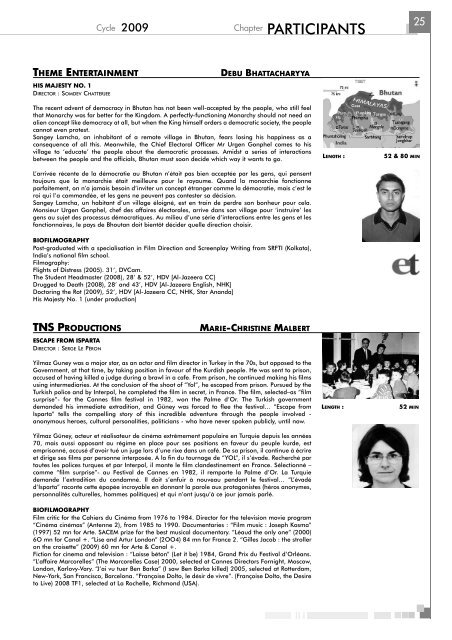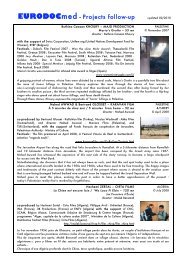Couv Cat 2009 - Eurodoc
Couv Cat 2009 - Eurodoc
Couv Cat 2009 - Eurodoc
- TAGS
- couv
- eurodoc
- eurodoc-net.com
Create successful ePaper yourself
Turn your PDF publications into a flip-book with our unique Google optimized e-Paper software.
Cycle <strong>2009</strong> Chapter<br />
THEME ENTERTAINMENT DEBU BHATTACHARYYA<br />
HIS MAJESTY NO. 1<br />
DIRECTOR : SOMDEV CHATTERJEE<br />
The recent advent of democracy in Bhutan has not been well-accepted by the people, who still feel<br />
that Monarchy was far better for the Kingdom. A perfectly-functioning Monarchy should not need an<br />
alien concept like democracy at all, but when the King himself orders a democratic society, the people<br />
cannot even protest.<br />
Sangey Lamcha, an inhabitant of a remote village in Bhutan, fears losing his happiness as a<br />
consequence of all this. Meanwhile, the Chief Electoral Officer Mr Urgen Gonphel comes to his<br />
village to ‘educate’ the people about the democratic processes. Amidst a series of interactions<br />
between the people and the officials, Bhutan must soon decide which way it wants to go.<br />
L’arrivée récente de la démocratie au Bhutan n’était pas bien acceptée par les gens, qui pensent<br />
toujours que la monarchie était meilleure pour le royaume. Quand la monarchie fonctionne<br />
parfaitement, on n’a jamais besoin d’inviter un concept étranger comme la démocratie, mais c’est le<br />
roi qui l’a commandée, et les gens ne peuvent pas contester sa décision.<br />
Sangey Lamcha, un habitant d’un village éloigné, est en train de perdre son bonheur pour cela.<br />
Monsieur Urgen Gonphel, chef des affaires électorales, arrive dans son village pour ‘instruire’ les<br />
gens au sujet des processus démocratiques. Au milieu d’une série d’interactions entre les gens et les<br />
fonctionnaires, le pays de Bhoutan doit bientôt décider quelle direction choisir.<br />
BIOFILMOGRAPHY<br />
Post-graduated with a specialisation in Film Direction and Screenplay Writing from SRFTI (Kolkata),<br />
India’s national film school.<br />
Filmography:<br />
Flights of Distress (2005). 31’, DVCam.<br />
The Student Headmaster (2008), 28’ & 52’, HDV [Al-Jazeera CC]<br />
Drugged to Death (2008), 28’ and 43’, HDV [Al-Jazeera English, NHK]<br />
Doctoring the Rot (<strong>2009</strong>), 52’, HDV [Al-Jazeera CC, NHK, Star Ananda]<br />
His Majesty No. 1 (under production)<br />
TNS PRODUCTIONS MARIE-CHRISTINE MALBERT<br />
ESCAPE FROM ISPARTA<br />
DIRECTOR : SERGE LE PÉRON<br />
Yilmaz Guney was a major star, as an actor and film director in Turkey in the 70s, but opposed to the<br />
Government, at that time, by taking position in favour of the Kurdish people. He was sent to prison,<br />
accused of having killed a judge during a brawl in a cafe. From prison, he continued making his films<br />
using intermediaries. At the conclusion of the shoot of “Yol”, he escaped from prison. Pursued by the<br />
Turkish police and by Interpol, he completed the film in secret, in France. The film, selected–as “film<br />
surprise”- for the Cannes film festival in 1982, won the Palme d’Or. The Turkish government<br />
demanded his immediate extradition, and Güney was forced to flee the festival… “Escape from<br />
Isparta” tells the compelling story of this incredible adventure through the people involved -<br />
anonymous heroes, cultural personalities, politicians - who have never spoken publicly, until now.<br />
Yilmaz Güney, acteur et réalisateur de cinéma extrêmement populaire en Turquie depuis les années<br />
70, mais aussi opposant au régime en place pour ses positions en faveur du peuple kurde, est<br />
emprisonné, accusé d’avoir tué un juge lors d’une rixe dans un café. De sa prison, il continue à écrire<br />
et dirige ses films par personne interposée. A la fin du tournage de “YOL”, il s’évade. Recherché par<br />
toutes les polices turques et par Interpol, il monte le film clandestinement en France. Sélectionné –<br />
comme “film surprise”- au Festival de Cannes en 1982, il remporte la Palme d’Or. La Turquie<br />
demande l’extradition du condamné. Il doit s’enfuir à nouveau pendant le festival… “L’évadé<br />
d’Isparta” raconte cette épopée incroyable en donnant la parole aux protagonistes (héros anonymes,<br />
personnalités culturelles, hommes politiques) et qui n’ont jusqu’à ce jour jamais parlé.<br />
BIOFILMOGRAPHY<br />
Film critic for the Cahiers du Cinéma from 1976 to 1984. Director for the television movie program<br />
“Cinéma cinémas” (Antenne 2), from 1985 to 1990. Documentaries : “Film music : Joseph Kosma”<br />
(1997) 52 mn for Arte. SACEM prize for the best musical documentary. ”Léaud the only one” (2000)<br />
6O mn for Canal +. “Lise and Artur London” (2OO4) 84 mn for France 2. “Gilles Jacob : the stroller<br />
on the croisette” (<strong>2009</strong>) 60 mn for Arte & Canal +.<br />
Fiction for cinema and television : “Laisse béton” (Let it be) 1984, Grand Prix du Festival d’Orléans.<br />
“L’affaire Marcorelles” (The Marcorelles Case) 2000, selected at Cannes Directors Fornight, Moscow,<br />
London, Karlovy-Vary. “J’ai vu tuer Ben Barka” (I saw Ben Barka killed) 2005, selected at Rotterdam,<br />
New-York, San Francisco, Barcelona. “Françoise Dolto, le désir de vivre”. (Françoise Dolto, the Desire<br />
to Live) 2008 TF1, selected at La Rochelle, Richmond (USA).<br />
PARTICIPANTS<br />
25<br />
LENGTH : 52 & 80 MIN<br />
LENGTH : 52 MIN



